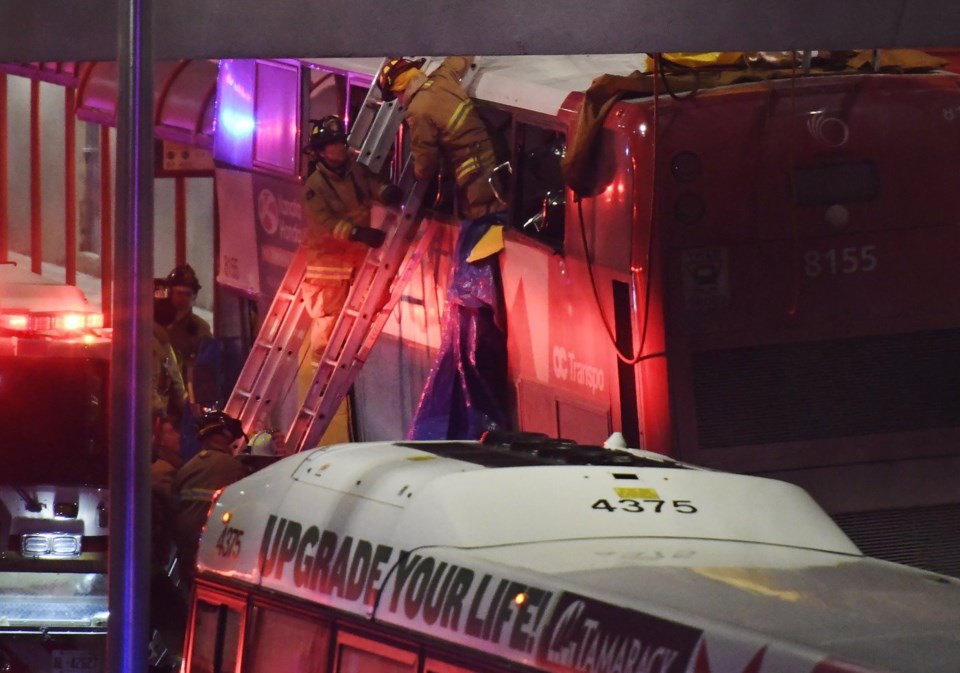The jury at a coroner’s inquest into a 2019 Ottawa bus crash that killed three people made 60 recommendations on Thursday aimed at preventing similar deaths in the future – including the installation of driver-facing cameras on the city's transit buses.
The inquest, which took place over three weeks and heard from many expert witnesses, examined the circumstances surrounding the deaths of Judy Booth, Bruce Thomlinson and Anthonia Van Beek.
All three died after a double-decker bus operated by OC Transpo hopped a curb and struck a shelter at the Westboro transit station on Jan. 11, 2019. Nearly two dozen others were injured in the crash as the shelter's awning carved into the upper level of the bus and crushed a number of seats.
Coroner's inquest juries do not assign blame or make findings of legal responsibility in a case, but are expected to determine a cause of death and can provide recommendations to prevent future deaths. In this case, the jury deemed the bus crash deaths to be accidents.
Among the jury's recommendations are the installation of radar speed signs on all bus transitways, assessing new drivers for proficiency on all bus types and introducing dedicated buses for training.
The jury also recommended that the city install driver-facing cameras on buses.
"The city should install operator-facing cameras on all OC Transpo buses to be used for safety purposes, while ensuring appropriate protections for employees' privacy," the recommendation read, noting the city could look to federal railway regulations for guidance on implementing the cameras.
The jury further recommended that the province's transportation ministry consider adopting mandatory standards for driver-facing cameras on municipal transit buses, and that Transport Canada should consider the same measure for federally-regulated municipal transit agencies. It said the federal government should consider expanding the mandate of the Transportation Safety Board to require investigation into serious transit bus crash deaths.
The jury also called on the city to expand its bus operator mentorship program to provide drivers with additional guidance and support, and introduce scenario-based and remedial skills training. Following a serious collision, the city should "require continued followup of operator performance to assess the need for further training, including through on-road observations, on-road assessments and telematics, as appropriate," the jury recommended.
OC Transpo bus driver Aissatou Diallo was acquitted of all criminal charges in the case in 2021.
The jury heard earlier in the inquest that Diallo was cleared to drive buses again just one week before the 2019 crash, after being involved in another collision a month earlier and undergoing retraining.
Inquest counsel Alessandra Hollands had read a report stating that the root cause of the previous collision "was determined to be operator error and failure to adjust speed to road conditions."
The jury also heard about a Transport Canada report into the 2019 crash, which found that the bus was travelling between 58 to 60 kilometres an hour when it left the roadway, before striking a rock cut and then the overhead canopy at the transit station.
Inquest counsel Peter Napier had said the report found that "no braking took place after the bus left the roadway" and that it took the bus eight seconds to come to a rest.
The inquest had also heard from some family members of the victims. Among them was Judy Booth's daughter Karen Benvie, who said the loss left her family with unanswered questions and unbearable grief.
"Her absence is felt every day in the silence where her laughter used to be and in the spaces where her presence once brought warmth and light," Benvie told the inquest.
Ottawa's interim city solicitor said in a statement Thursday that the jury's work on the recommendations is appreciated and the city will take "the necessary time to carefully review and assess them."
This report by The Canadian Press was first published May 1, 2025.
Rianna Lim, The Canadian Press




